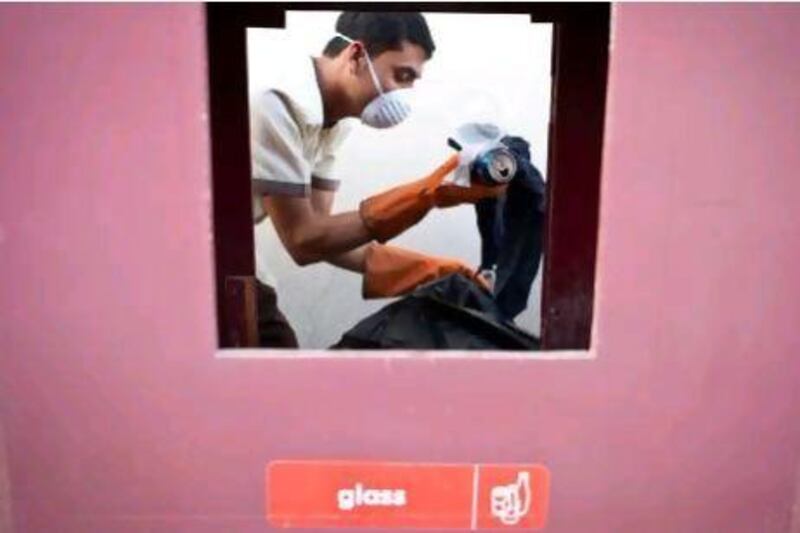DUBAI // Experts have welcomed a directive requiring malls to recycle but say more needs to be done to tackle their environmental impact.
From February, all Dubai malls will be required to implement some form of recycling.
But the directive does not outline exactly what form this should take. Some experts believe that for the drive to be successful, the order needs to be specific, such as a requirement to recycle the waste created by shoppers.
Many malls already recycle to differing degrees, using private companies to segregate waste and pass it on for reprocessing.
Most recycle cardboard boxes and plastic, in which bulk deliveries tend to be packaged.
The National asked three major waste management companies – Union Paper Mills, Averda International and Zenath Recycling and Waste Management, who between them service 15 malls and shopping centres – for their opinions on the new directive.
Huzaifa Rangwala, manager of marketing and contracts at Union Paper Mills, which services 10 malls, including several of the emirate’s largest properties, said shopping centres should be urged to collect and recycle the waste produced by shoppers, not just stores.
“Retailers will be more aware [as a result of the directive] but I do not think [the directive] will have a substantial impact unless they extend it inside the malls,” he said.
There are public recycling bins in only one mall – the food court of Dubai Festival City. But introducing public recycling bins, especially ones that look good, would be costly, warned Mr Rangwala.
John Irvine, the managing director at Averda, agreed that setting up a scheme could be costly and “difficult for malls to manage individually”.
“Recycling is not cheap but there are ways and means to mitigate the cost,” he said. “If it is managed properly, implemented correctly, and there is awareness among stakeholders, it will not be a burden on the malls.”
Averda is working with three malls on their recycling schemes and has had interest from more.
"Because of the initiative, we have already been contacted by several others to come speak to them," Mr Irvine said.
Mahmoot Sait, the general manager at Zenath, said the new rules would improve malls’ recycling rates only if they were stringently applied. He also warned that recycling had to be made profitable for it to be embraced fully.
“The biggest challenge for us is trading the end product to recycling companies,” he said.
Mr Sait said trade was possible for recycled paper, plastic and metal but it was harder to trade recycled glass and local reprocessing facilities avoid coloured glass.
Two years ago, the company had to pull out of a recycling programme as it could not find a market for the contaminated plastic and glass it collected.
"You need someone to use the [recycled] material," said Mr Sait.
Malls that have already embraced recycling include Oasis Centre and the Mall of the Emirates.
Every month, Oasis Centre recycles, on average, two cubic metres of aluminium cans, 12.5 tonnes of cardboard and 25 cubic metres of kitchen and food waste.
“Oasis Centre complies with the latest Dubai Municipality regulations and has put up four colour-coded containers, which make for more effective waste segregation,” said the centre’s director, Neelesh Bhatnagar.
At Mall of the Emirates, about 900 tonnes of cardboard, 20 barrels of used cooking oil and up to four tonnes of plastic are recycled each month, said Anna Mansour, senior manager.
“The regulation will definitely bring positive benefits on our waste programme as it presents an opportunity to review our recycling facility and ensure it is in line with the government’s regulations,” she said.





